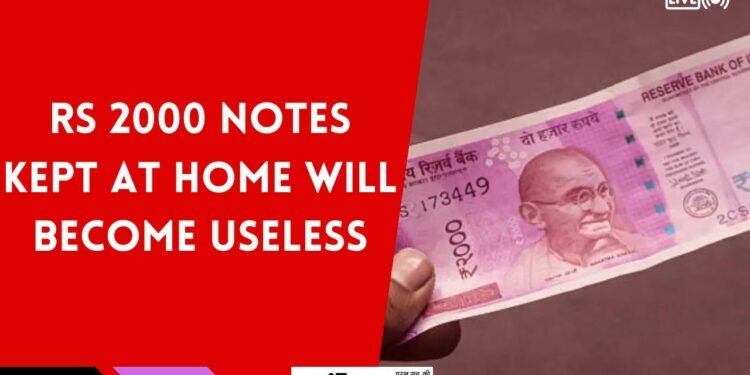- Highlights
- Banks will not give ₹2000 notes to customers with immediate effect
- Only notes worth Rs 20,000 will be exchanged at a time
- Rs 2000 notes were issued for the first time in November 2016
RS 2000 notes: The Reserve Bank of India (RBI) announced on Friday the withdrawal of Rs 2000 notes from circulation. However, notes of this denomination can be deposited or exchanged in banks till September 30. In a statement issued in the evening, the RBI said that Rs 2000 notes currently in circulation will continue to be legal tender till September 30. Along with this, RBI has asked banks to stop giving Rs 2000 notes with immediate effect. Now what will happen to these notes? What should those who have 2000 notes do? Till when these notes will be deposited in the bank. Will there be any charge also? Learn the answers to all the questions related to the 2000 note ban:
Why are Rs 2,000 notes denomination banknotes being withdrawn?

Rs 2000 notes were introduced in November 2016. Its purpose was that after the withdrawal of 500 and 1000 rupee notes, the need of currency in the economy could be met rapidly. With that purpose being served and the availability of notes of other denominations in sufficient quantity, the printing of Rs 2000 notes was discontinued in 2018-19. Most of the Rs 2000 denomination notes were issued before March 2017. The estimated life span of these notes was only 4-5 years. It was also observed that notes of this denomination are not generally used for transactions. The stock of banknotes of other denominations continues to be sufficient to meet the currency requirement of the public. Keeping these considerations in mind and in accordance with the ‘Clean Note Policy’ of the Reserve Bank of India, it has been decided to withdraw the Rs 2000 notes from circulation.
What is a Clean Note Policy?
It is a policy adopted by the RBI to ensure the availability of good-quality banknotes to the public.
What is the legal status of Rs 2000 notes?
Rs 2000 notes will retain their legal validity.
Can Rs 2000 notes be used for normal transactions?
Yes. The public can continue to use Rs 2000 notes for their transactions. Can also get them in payment. However, they are encouraged to deposit and/or exchange these banknotes on or before September 30, 2023.
What should the public do with Rs 2000 notes kept with them?

The public can approach bank branches to deposit and/or exchange Rs 2,000 notes in their possession. The facility to deposit in accounts and exchange Rs 2000 notes will be available in all banks till September 30, 2023. The exchange facility will also be available till September 30, 2023, in 19 regional offices of RBI which have issue departments.
Is there any limit for depositing Rs 2000 notes in a bank account?
Deposits can be made into bank accounts without any restrictions, subject to compliance with extant KYC norms and other applicable requirements.
Is there a limit on the amount of Rs 2000 bank notes exchanged?
The public can exchange Rs 2000 notes up to a limit of Rs 20,000 at a time.
Can Rs 2000 notes be exchanged through Business Correspondents?
Yes, Rs 2000 notes can be exchanged through Business Correspondents up to a limit of Rs 4,000 per day for an account holder.
From which date the exchange facility will be available?

In order to give banks time to make preparatory arrangements, the public is requested to approach bank branches or Regional Offices of the Reserve Bank of India from May 23/2023 for availing of the exchange facility.
Is it necessary to be a bank customer to exchange 2000 notes from bank branches?
No. A non-account holder can also exchange Rs 2,000 notes at any bank branch up to a limit of Rs 20,000 at a time.
What if someone needs cash of more than ₹20,000 for business or other purposes?
Deposits to the accounts can be made without any restrictions. Rs 2,000 notes can be deposited in bank accounts and then these deposits can be withdrawn as per the cash requirement.
Are there any charges for the exchange facility?
No. You will be given the exchange facility free of cost.
YOU MAY READ: Exploring the Spiritual Significance of Varanasi, and a City Efficiency easily . /19/23
Will there be special arrangements for exchange and deposit for senior citizens, persons with disabilities, etc.?
Banks have been instructed to make arrangements to minimize inconvenience to senior citizens, persons with disabilities, etc., who wish to exchange/deposit Rs 2,000 notes.
What if one cannot deposit/exchange Rs 2,000 bank notes immediately?
In order to make the entire process convenient for the public, a period of more than four months has been given for depositing and/or exchanging Rs 2,000 notes, therefore the public is advised to avail the facility within this time.

What if a bank refuses to exchange/accept/deposit the Rs 2,000 banknote?

The complainant / aggrieved customer may first approach the concerned bank. If the bank does not respond within a period of 30 days of lodging the complaint or if the complainant is not satisfied with the reply given by the bank, the complainant can lodge a complaint under the Reserve Bank Integrated Ombudsman Scheme at cms.rbi.org.in Is.



